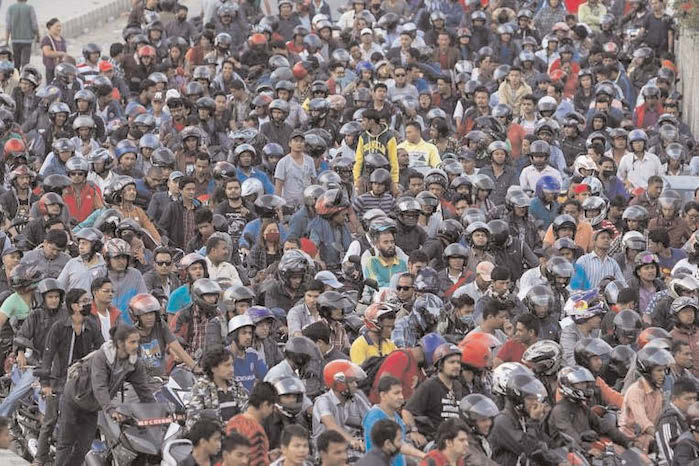
KATHMANDU (TIP): Large white tents and tin shacks scatter the hills near Kathmandu. They house some of the thousands who lost their homes in the devastating earthquake in April -and are the most visible sign of lagging recovery efforts.
Those efforts have slowed even further recently . For the past two months, Nepal‘s southern ethnic minority , the Madhesi, has been barring the entry of trucks of fuel and essential goods from India as part of protests demanding greater rights under Nepal’s new constitution. The blockade has left this Himalayan-locked country with shortages of fuel and cooking gas, medicines, and increasingly , basic relief supplies like tents and blankets -even as winter approaches.
“It’s been one thing after another (holding up relief). First the monsoon, then the holiday season, and now the fuel blockade,” said Bhushan Tuladhar, a regional technical advisor to UN-Habitat, whose sanitation programme in quakehit areas has been affected by shortages in construction material. If the crisis continues, warned Oxfam, Unicef and other relief groups recently, relief could grind to a complete halt. Quake relief aside, fuel shortages have affected every aspect of daily life.
Kathmandu has become a city of queues -mile-long lines for petrol and diesel, winding snakes for LPG cylinders.Commuting is a challenge: Public buses are overcrowded, taxi prices have shot up and many schools have shut. A black market in petrol is flourishing, and is the main reason you still see private vehicles on the road. One journalist told me that her family lives near the border and drives over into India to get fuel. A young pharmacist at Sumeru Hospital in Lalitpur said he pays `250 for a litre of petrol, three times the gas station price.
Like other hospitals, Sumeru is running low on injectable antibiotics and lifesaving drugs. “If this continues, we’re going to be in real trouble,” the pharmacist said. Tourism, an economic mainstay, has also been hit. At Club Himalaya, a resort in Nagarkot, a hill station one hour from Kathmandu, many rooms are empty .
The resort manager blamed higher transport prices and fewer vehicles plying. In Kathmandu, the government is selling discounted firewood for cooking but that doesn’t help apartment-dwellers or small cafes.At a tiny eatery in the Patan area, dishes disappear from the menu every day . Noodles are difficult to procure so no more noodle dishes. A cup of tea costs five rupees more now -sugar prices are up, said owner Mahesh Panday .
A few other eateries display “no gas” menus and one institutional canteen even labels theirs the “The Modi Menu”-a reflection of how much Nepalis blame India for the crisis.
The Indian government supports the demands of the Madhesis, who are culturally tied to India, for greater rights and representation. But Indian officials have denied helping the blockade. No body here believes that; Nepal PM K P Sharma Oli even described India’s role as “more inhumane than a war”.
Remarkably , Indians still encounter little hostility or anger on the ground. One local journalist asks what regular Indians think of the situation: I don’t tell him that most are oblivious to the crisis in relations with one of their closest neighbours -a crisis that comes just a few months after India earned enormous goodwill for its help in post-quake rescue and relief.
“Relations between India and Nepal were at such a high (after the quake)… all that is lost,” Swarnim Wagle, a recent member of the National Planning Commission, told me.”Nepali people just cannot reconcile such generosity then with the level of interference today .” Still, he blamed both governments for botching up, and downplayed Nepal’s turn to China for fuel and emergency supplies. “There is feeling that we need to wean away from excessive dependence on India,” Wagle said. Yet “there’s no option but to salvage the India-Nepal relationship,” he added. “We have a shared future.”





Be the first to comment